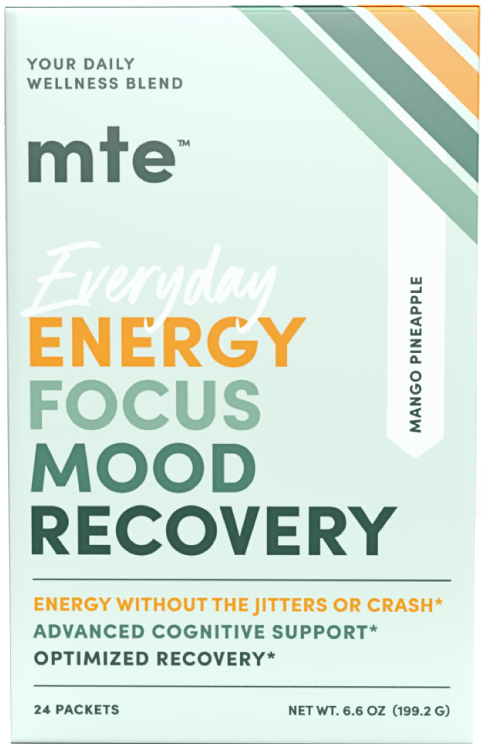
Nootropics for Energy: A Viable Alternative to Caffeine?
In the search for the best way to replace your caffeine habit with a more sustainable and healthy approach to energy, you’ve definitely come across nootropic drinks and supplements claiming they’re it. With the emergence of nootropics for energy, it seems there really is a viable way to get an energy boost without excessive caffeine or sugars. Bonus: it’s healthy, sustainable and supports way more than energy.
Let’s take a look at nootropics and the evidence it might be the ideal way to substitute your daily coffees with something healthier and more effective:
A Brief Recap on Nootropics
For deep dives into the nature of nootropics, check out our articles:
- What Are Nootropics? A Complete Guide to Brain-Boosting Plants
- Nootropics & the Science Behind Cognitive Enhancers
- 5 Natural Nootropics That Come with Research-Backed Receipts
- Can Nootropics Help with Mood Management?
For the cliff notes, check out this bullet list:
- Nootropics, also called cognitive enhancers, are a broad category of bioactive substances that claim to improve various aspects of brain function. They must be able to pass through the blood-brain barrier.
- Nootropics can be natural, synthetic, or prescription medications.
- Claimed benefits of nootropics include improved memory, focus, attention, learning, creativity, and overall cognitive performance.
- Prescription nootropics are used to treat specific conditions related to cognition and focus, including dementias and attention deficits.
- Over-the-counter nootropic supplements like saffron or GABA are consumed as energy and focus-boosters in the health and wellness market.
- Research results on the effectiveness of nootropics vary greatly depending on the specific substance and the desired outcome. (Refer to that list of deep-dive articles above for more on the bodies of research backing the effectiveness of our nootropic energy support.)
- Because of their bioactivity and the fact that they can pass through the blood-brain barrier, some nootropics may have side effects or interact with medications. Always consult your doctor before adding a daily nootropic supplement to your routine.
Clinical Evidence Nootropics Support Natural Energy
As we saw, besides focus and attention, the two biggest claimed benefits of utilizing nootropics are energy promotion and mood support. But as far as being an effective alternative to coffee and energy drinks, is the science there to support the potential of nootropics for caffeine-free energy?
So far, yeah –
A 2016 article titled “Establishing Natural Nootropics: Recent Molecular Enhancement Influenced by Natural Nootropic”, published in the Journal of Evidence-Based Complementary and Alternative Medicine took a look at the research behind nootropics from a biological perspective. And they found some compelling evidence on the potential of nootropics to promote innate energy production on a cellular level:
- “Introduction of natural nootropics in the system will increase the blood circulation to the brain and at the same time provide the important nutrient and increase energy and oxygen flow to the brain. Despite the 3% weight of total body weight, the brain receives around 15% of the body's total blood supply and oxygen. In fact, the brain can only generate energy from burning the glucose, proving that neuron depends on the continuous supply of oxygen and nutrients.”
- “Effects of natural nootropics in improving the brain function are also contributed through the stimulation of the new neuron cell. As incentive from the new neuronal cell, the activity of the brain is increased, enhancing the thinking and memory abilities, thus increasing neuroplasticity.”
A 2022 review of the academic literature strongly indicates nootropics may support mental energy identified over 3000 studies over the course of 6 searches. The review identified several distinct points supported by the research, including:
- “[Nootropic] herb extracts taken together exerted a significant anxiolytic effect without sedation and a significant improvement in cognitive performance.”
- “Standardized [nootropic] extracts have been largely suggested to act as effective vasomodulators by increasing blood flow to the brain and enhancing vascular permeability.”
- Regarding phenolytic compounds found in natural nootropics, a nootropic drink “induced a nonstatistical but self-reported improvement in the abilities to remember and think, energy levels and mood…”
- In exploring alertness: “In healthy adults, an enhancement of secondary memory and attention task performance was reported after an intervention with [nootropics]…”
- “…long-term treatment for 8 months with a [nootropic supplement]… improved several aspects of cognitive performance, including attention processes related to task execution speed.”
Nootropics in MTE & Why We Chose Them
Given the great word of mouth – on the streets and in the lab – we looked into nootropics pretty hard when we began working on MTE’s formulation. It really does seem like energy’s best-kept secret. Why are we all addicted to caffeine when we could use energizing ingredients that don’t come with caveats like jitters and fatigue?
In what became a bottomless pit of research (because we’re sort of super into the science of nootropics and adaptogens for energy and stress), we narrowed down the field to 4 key nootropics that (1) have a solid body of scientific research to indicate their potential health benefits, (2) work synergistically with other nootropics and adaptogens, and (3) do what we want them to: support energy, focus, cognition and performance – without caveats:
GABA
GABA isn’t just a nootropic; it’s an amino acid as well as a neurotransmitter our bodies naturally produce. GABA acts as the body’s main calm-down chemical, meaning that it tells overexcited neurons they need to chill out – it’s not that serious. A key actor in the energetic processes of the brain, GABA is associated with a clear and present yet relaxed state of mind.
L-Theanine
L-theanine, like caffeine, is found in the leaves of various species of tea plants. Its effects on the body are similar to caffeine, but better. In laboratory settings, l-theanine consumption has been associated with an increase in alpha waves in the brain. Alpha waves are associated with an alert calm. It has also shown potential to boost brain health, energy and immunity without activating a false stress response the way caffeine does.
Saffron
Everyone knows what saffron is, but it’s useful for much more than seasoning an authentic seafood paella. Part superfood and part nootropic, saffron contains many bioactive, health-boosting compounds, the most powerful of which are crocin and crocetin. These seem to affect energy and focus indirectly by supporting and stimulating vital systems in the body and promoting the health of your brain, heart, liver, kidneys, and more.
Paraxanthine
We love all our nootropics equally, but paraxanthine really is the golden child (don’t tell them that). A new-to-the-scene nootropic extract, paraxanthine is quickly becoming the new standard in caffeine-free, jitter-free energy that supports focus, metabolism and energy. And as the newest, shiniest of MTE’s ingredients, we’re gonna belabor the point a little bit with this one:
What is Paraxanthine?
Paraxanthine is a naturally-occurring compound that, until recently, we have only been able to observe in laboratory settings. It’s a metabolite of caffeine that is produced in the liver. When you down that caffeinated energy drink, the caffeine keeps itself together until it hits the liver, where it’s broken down into 3 main byproducts: paraxanthine, theobromine and theophylline.
Paraxanthine makes up over 80% of those caffeine byproducts. Its chemical signature is very similar to caffeine, but somehow that simple breakdown of a single methyl group changes everything. Researchers are fast learning that not only is it as effective as caffeine for energy, focus, performance, and thermogenesis, but its bioactivity isn’t toxic – it doesn’t elicit a false stress response and doesn’t spike blood pressure or blood sugar.
There are already multiple studies supporting the 4 claims just mentioned above, but for our purposes here, we’ve chosen one for each:
Energy
A 2010 study wanted to know about paraxanthine vs caffeine’s energy-boosting effects after 3 doses. Paraxanthine increased wakefulness more than and for longer than an equal dose of caffeine. It also increased muscle activity and body temperature (thermogenesis), and it failed to cause hypothermic effects at high doses. It also failed to elicit the same anxiolytic (read: stress-inducing) effects as caffeine.
Focus
A study from 2021 looked at paraxanthine’s effects on cognition, including short-term memory and attention. Subjects took a series of clinical inventory tests, ingested placebo or paraxanthine, and then repeated the tests every hour up to 6 hours. The quantifiable results of these tests indicated that not only did paraxanthine improve short-term memory (retrieval) even in complex tasks, but promoted sustained focus (attention, vigilance), and improved response time and reasoning.
Metabolism
A study from 2024 explored paraxanthine’s potential to induce thermogenesis. Hemodynamics were analyzed before ingestion, then at 30-minute intervals up to 180 minutes. They observed paraxanthine increase free fatty acids in the bloodstream, higher rates of fat oxidation and increased energy expenditure – all signs of lipolysis. Interestingly, paraxanthine also decreased heart rate and feelings of hunger, relative to control.
Performance
A study from 2022 looked at the effects of 4 weeks of paraxanthine supplements on physical performance by using 60 minute treadmill runs as a litmus test. Subjects completed the 60 min sets 5 times per week. After 4 weeks, the paraxanthine group had increased calf muscle mass by 17-41%, treadmill performance by 39%, and nitric oxide levels by 100%. In addition, cholesterol was lower in this group after the 4 weeks.
Get Nootropic-Stacked Energy Daily With MTE
There’s more to life than coffee and exhaustion. Consider the possibilities of natural nootropic energy – all the upsides of caffeine (energy, focus and performance) without the downsides of feeling cracked out and p*ssed off, only to crash and end up more tired than you were before. That’s toxic. Walk away.
Instead, a daily scoop of our healthy nootropic energy drink can support natural, sustainable energy throughout the day, with tranquil mood via the promotion of feel-good chemical production in the brain. Meanwhile, you’ll also get support for gut, immunity, rest and recovery, stress resilience, and more. Peep your new go-to alternative to caffeine: nootropic-packed MTE.



